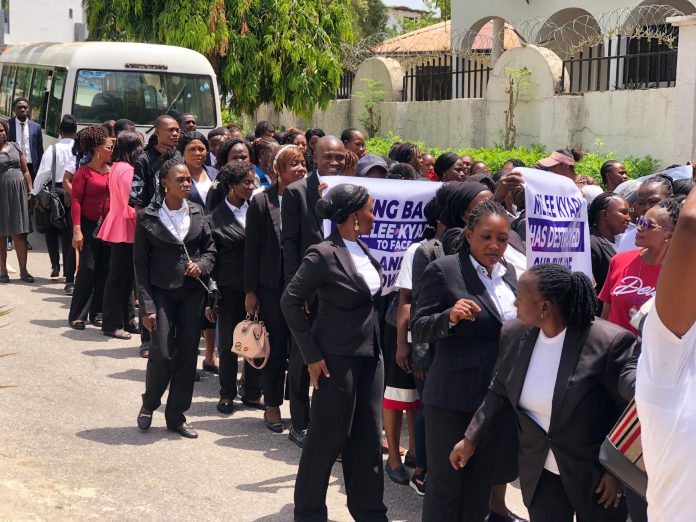
Hundreds of young professionals from various fields in Nigeria on Wednesday stormed the United Arab Emirates (UAE) Embassy in Abuja, demanding that the country to deport Mele Kyari, former Group Chief Executive Officer of the Nigerian National Petroleum Company (NNPC) Limited, to continue the ongoing probe over alleged corruption and sabotage.
The Young Professionals Forum (YPF) noted that Kyari’s alleged corrupt practices have had far-reaching implications for Nigeria’s economy and energy sector.
The protesters claim that Kyari’s tenure was marked by deliberate obstruction of local refining initiatives, blatant disregard for national interests, and personal enrichment.
Speaking on behalf of the group, Barrister Sambari Benjamin alleged that Kyari’s actions have crippled national productivity, drained Nigeria’s foreign exchange reserves, and increased the vulnerability of consumers to adulterated petroleum products.
The Young Professionals Forum is urging the UAE government to refuse Kyari residency, asylum and to blacklist him to prevent his escape from justice.
“We believe that Mele Kyari’s actions have brought shame to our nation and our people. His alleged corrupt practices have had devastating consequences for our economy and our people. We cannot stand idly by while those in positions of authority abuse their power for personal gain,” said Benjamin.
“We urge the UAE government to refuse Kyari residency, asylum, and to blacklist him to prevent his escape from justice. The Nigerian people demand accountability and transparency, and we will not rest until justice is served.”
The protesters emphasized that granting Kyari asylum would undermine the rule of law and set a dangerous precedent for other public officials who might seek to escape accountability by fleeing abroad.
They called on the UAE government to uphold its commitment to international cooperation and justice by denying Kyari refuge.
“The implications of granting haven—whether directly or inadvertently—to Kyari are manifold. Firstly, it would constitute a direct affront to the Nigerian judicial process, which is on the verge of initiating investigations and possible prosecutions against him and his accomplices,” Benjamin added.
“More devastatingly, this would obviously send an unfortunate message to the people of Nigeria, most especially the youth and emerging professionals— that accountability is optional, that impunity is mobile, as that justice can be conveniently overridden or circumvented by the elites who can afford the financial prize.
“We, the Young Professionals Forum of Nigeria, therefore urge, in the strongest possible terms, that the United Arab Emirates refuse them residency and asylum. Let it not be said that the UAE, a nation of high moral standing, became an escape route for two of the most controversial figures in Nigeria’s contemporary regulatory history.”






